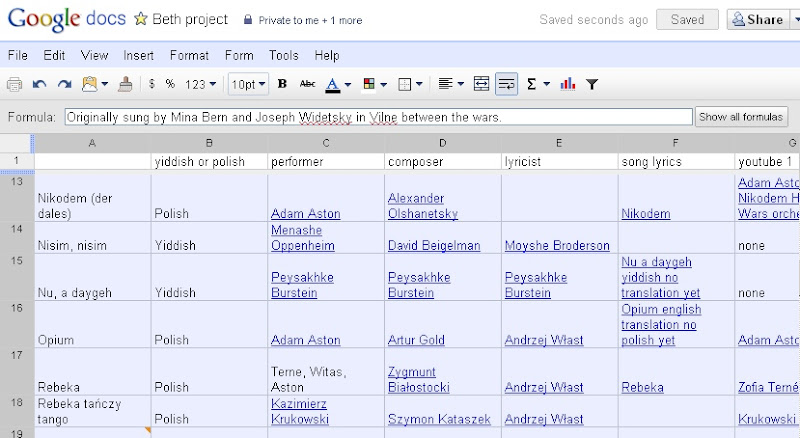Yitskhok Zhelanek, where did you go?
 It's a long story, but as part of a cd project focusing on Polish and Yiddish language theater, revue, vaudeville, tangos, kleynkunst, I spent a month trying to wheedle a copy of this book (along with three other similar ones) out of the National Library in Jerusalem. Like the others, this one is a random collection of song texts and monologues famous in the mid-1930s in Warsaw.
It's a long story, but as part of a cd project focusing on Polish and Yiddish language theater, revue, vaudeville, tangos, kleynkunst, I spent a month trying to wheedle a copy of this book (along with three other similar ones) out of the National Library in Jerusalem. Like the others, this one is a random collection of song texts and monologues famous in the mid-1930s in Warsaw. I was kind of crushed after paying so much for the book (which only cost a few groshen when it came out) that there were no tunes, just words. I felt punched in the solar plexus when I saw somewhere near the end of the book:
If you want to learn the melodies to these songs, come to Yitskhok and he'll teach them to you.
Yitskhok is my guy. Or rather, I'm him, I'm the one who puts together little books and offers to teach people the tunes. This book was only about five inches high. Did he print it in his basement? Did he make this wonderful picture? What happened to him? Warsaw, in the 1930s. Yitskhok, did you run? There are lots of songs from those days making fun of America or worrying about what it would be like to leave home for parts unknown. Yitskhok, did you make it to Miami Beach, by some miracle... or are your bones in a pit in the forest?
I want to go to Yitskhok and have him teach me the tunes. Failing that, I want to know his children and grandchildren, though probably he never got to have any. In fact, I'm afraid he's really completely lost. Hard to know; hard to look up people from their Yiddish names. Often the name is quite, quite different in its English or Polish equivalent. I don't know how to look for him. Maybe he became Isaac Zelanek, or spelled his name with some of those odd Polish letters... or maybe he just got murdered in a gas chamber before he could ever have a family and maybe nobody who knew Itskhok, who sold the cheapest songs (as he boasted elsewhere in this book) survived to remember him.





 A few of my daughter
Melina's great posts:
A few of my daughter
Melina's great posts:







